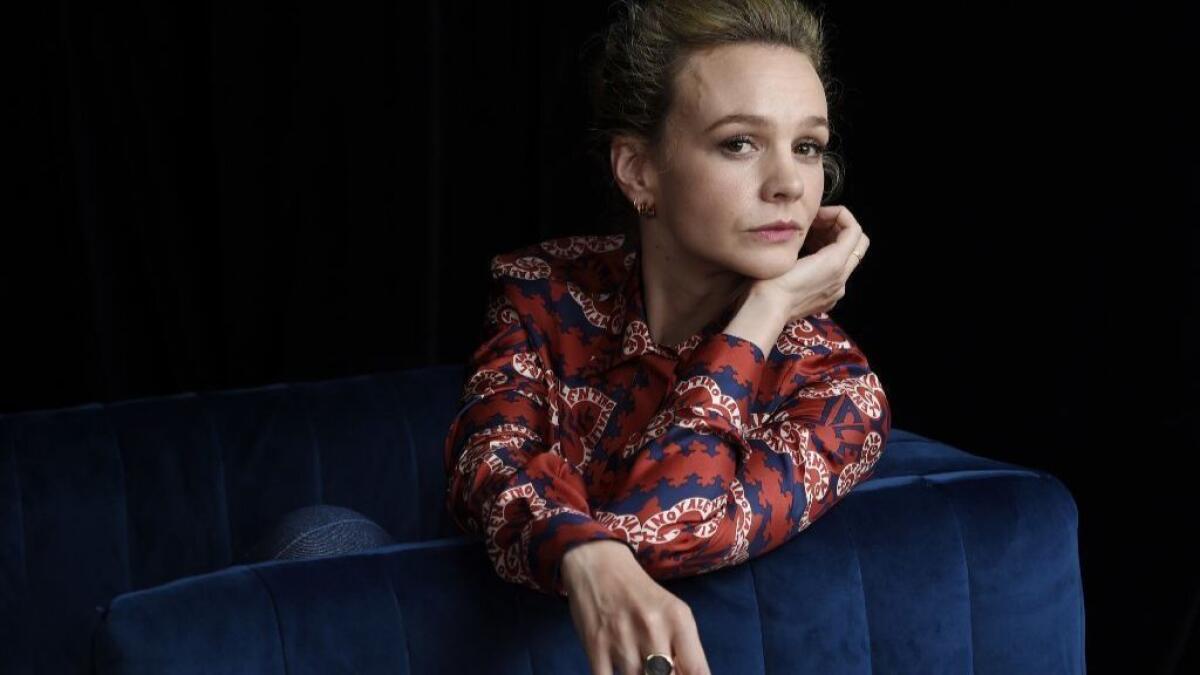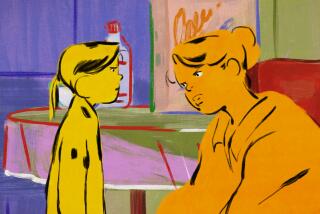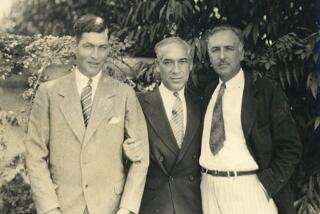Versatile Carey Mulligan breaks out of societal confines in ‘Wildlife’ and opens her door to Pixar

Sitting with one foot on the chair at a sleek Beverly Hills café, Carey Mulligan remembers being in her London home with infant daughter and musician-husband Marcus Mumford when she received Paul Dano’s script for “Wildlife.”
“It came out of the blue at 6,” she recalls. “I read it by 7:30 and was on the phone with Paul at 8 saying yes! From the very first read, I loved that my character does things that are misguided and ill-judged, but she’s not a totally bad parent. She’s just having a really bad week. And we don’t see women very often in movies having a really bad time.”
Adapted from Richard Ford’s 1990 novel by actor-director Dano and his partner, actress Zoe Kazan, “Wildlife” takes place in 1960 Nebraska. Mulligan’s Jeanette initially looks the part of a complaisant midcentury American housewife complete with apron and dish-washing gloves. But when her unemployed husband Jerry (Jake Gyllenhaal) leaves home for a temporary firefighting job, Jeanette tries out a brash new persona, much to the dismay of her 14-year-old son, Joe (Australian newcomer Ed Oxenbould).
“As long as Jerry keeps up his side of the bargain and maintains this cheerful veneer, then she’ll do the same,” Mulligan explains. “But when Jerry breaks the contract, Jeanette snaps from the pressure building over the years of having to be this perfect wife who always responds in the appropriate and kind way. She goes like, ‘Argh – I’m done!’”
Jeanette, unleashed from her routine, gets a job and pulls Joe from school for a day trip to the forest fires. On the road, she shares bitter observations with the bewildered teenager. Mulligan says, “Jeanette needs to destroy Joe’s ideas of who she is. ‘My name is Jeanette, I hate my … name. I used to be a schoolteacher. I had all this potential and now it’s all gone.’ Jeanette’s telling Joe, ‘Forget everything you know about me, it’s not real, I’m burning it all down and starting again.’”
In one of the film’s most compelling sequences, Jeanette 2.0 slips into a slinky “desperation dress” and takes her son to an awkward dinner at the home of a wealthy car dealer (Bill Camp). Drinks inspire Jeanette to try out her cha-cha moves.
“I’m a terrible dancer,” Mulligan chortles. “I wanted to be a musical-theater actress when I was younger and one of the big stumbling blocks was that I can’t dance, at all. So Paul sent Bill and me to this local studio in Oklahoma and I took a couple of cha-cha classes. Of course, when we shot the scene, Jeanette was so drunk there was no real cha-cha going on. She’s stumbling and falling over. But yes, there were lessons.”
Did the actress have an actual drink to loosen up before cameras started rolling? “God no, I never drink when I’m working,” Mulligan says, before catching herself. “That’s not true,” she confesses. “I had a whiskey before I did the singing scene in ‘Shame’ because I was so paralyzed by fear, having to sing in front of all these extras.”
“She’s just having a really bad week. And we don’t see women very often in movies having a really bad time.”
— Carey Mulligan
Mulligan, who caught the acting bug after watching her brother perform in a grade-school production of “The King and I,” knows how to carry a tune. “But that’s the extent of it,” she says. “It’s another reason I never got any further with my musical-theater dream.”
The nonsinging roles have worked out spectacularly. At age 23, Mulligan earned an Oscar nomination for her performance as a restless British schoolgirl in “An Education.” She then portrayed Daisy Buchanan (“The Great Gatsby”), a folk singer (“Inside Llewyn Davis”), a working-class activist (“Suffragette”) and a weary farmer’s wife (“Mudbound”). But she cites her experience performing Anton Chekhov’s “The Seagull” on Broadway as her most transformative role.
“Up until ‘The Seagull,’ I was always [playing] some version of myself,” says Mulligan, motioning to the dime-sized bird tattoo on her wrist. “The director, Ian Rickson, helped me understand how to create a character, which I’d never really done before. It’s less emotional recall, more imagination.”
Since parting ways with her richly imagined “Wildlife” character, Mulligan played a pregnant detective on the miniseries “Collateral,” then performed the one-woman show “Girls & Boys” five months after giving birth to her baby boy.
Next up? “I just want to put this out there,” Mulligan announces. “I really want to do a Pixar movie. I want to be, like, a troll or something.”
More to Read
From the Oscars to the Emmys.
Get the Envelope newsletter for exclusive awards season coverage, behind-the-scenes stories from the Envelope podcast and columnist Glenn Whipp’s must-read analysis.
You may occasionally receive promotional content from the Los Angeles Times.






